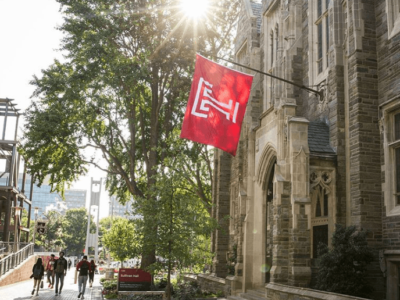In a moment of either pure excitement, anxiety or calamity your hand grazes over the mouse to click on your email from the University of California, Los Angeles. You read the first line, and–Congratulations! You made it into UCLA!
Just when you thought it was easy breezy sailing from here, college actually introduces a whole new monster of its own.

Now, before you get caught up in the whirlwind of orientation, rating college dining hall food and college parties, sit back and ask questions. From a graduating senior who has gone through it herself, here lie the precious pieces of advice I wish I knew as a freshman and the sure-fire ways to make the most of your time as a new Bruin:
1. Utilize your Bruin card opportunities

You see that small plastic card you shoved in your pocket right after receiving it because you hate how your picture came out? Well, believe it or not, that card, otherwise known as your Bruincard, holds immense power and advantages. I daresay it relates to a pulling a wild card in UNO or having a backstage VIP pass at a Coldplay or Billie Eilish concert. An ID given to you at orientation, the Bruincard acts as your life source for all of freshmen through senior year. Not only does it help you with essentials like getting into your dorm room, unlimited access to the dining halls and proving your identity at exams, but it does so much more. Your Bruincard automatically gives you unlimited access to the school gyms like the John Wooden Center and BFit.
With a Bruincard in hand, you can do as much as rent out private rooms for a game of racquetball, use the rock-climbing wall and equipment and rent a basketball for a game of pickup on the courts. You can attend a majority of UCLA’s athletic events like their Olympian stacked women’s gymnastics team, soccer games and their nationally ranked softball team at tournaments to name a few. The CTO Office also offers free admission to yearly UCLA theatric events such as Spring Sing, one of UCLA’s oldest and largest a cappella show and their well-produced and highly popular Korean Culture Night. You can also get discounts on amusement parks like Universal Studios, Disneyland and Dodger games. As a senior about to graduate, I’m sad to say that I didn’t utilize my Bruincard opportunities as much as I would have liked to, so I beg the ultimate topic of interest at hand: Use your Bruincard.
2. Don’t Be Intimidated by the College Social Scene

In the adrenaline-filled weeks of moving away from home and finally taking steps toward your career at a prestigious university, you find yourself talking and getting the contacts of everyone you meet. As you spend the first few days with your orientation leader and peers with your same major, the promising thought of gasp — Have I made lifelong friends?! most likely crosses your mind. But just like anything, as soon as reality checks in and the quarter system demands of your time, energy, and soul, you realize that the college social scene proves intimidating and daunting to tackle. Walking into pin-drop silent discussion sections and seeing everyone on campus wearing earphones with their face in their phone makes you want to run back to the seclusion of your own dorm after every class. But I digress. So my advice: keep socializing after week zero. Don’t give up. Ask the friend you just met in your G.E class if they’d like to go textbook shopping with you. Introduce yourself to the people sitting next to you in your first week of class.
You’ll find that the small things and steps will counteract the social culture at UCLA, and before you know it, you’ll realize that socializing at UCLA does not seem that scary. Once you get to realize that the student body at the school seems just as smart as they are interesting, unique and diverse, you forgot those initial first impressions. College also offers the perfect opportunity to form lifelong friendships with the people you attend your first Beat ‘SC bonfire with, pull all-nighters during finals week and acting as your partner in crime in your night shenanigans on Friday nights. One of the key ways to form these friendships and find your crowd includes making yourself open–after all, college means a new start right? Talk to the neighbors and floor-mates living in your dorm. Get involved in that one club that you received a flyer for on Bruinwalk. Get to know your roommates deeply and intimately as you share the next year living in the claustrophobic cube UCLA calls your dorm room. At the end of it all, you’ll look back and realize that the friends you’ve made at UCLA are the most memorable and impactful.
3. Quick! Study Abroad Before Life Gets Busy!

Remember that one fantasy in high school where you pictured a life spent in France as you spent your days sipping tea, conquering the Eiffel tower and people-watching at local Parisian cafes all while getting your education? Well, my friend, college offers the perfect time to turn this fantasy into your actual college life. Something no one ever talks about includes the fact that from freshman year, college only gets busier with upper-division classes, internships and new opportunities. The summer after freshman or sophomore year, or even fall and spring quarters offer the perfect opportunity for you to get out there and experience the world for yourself. Even better, as one of the top universities in the nation, UCLA only offers the best programs located in places like Europe, Asia and even Central America. As you look back on your college years as a young adult or middle-aged mother or father, you learn that some of your best memories come from times studying abroad and stepping out of your usual comfort zone. So pack your bags, pick out a country that you’d love to explore, and head on your way to conquer the world as a Bruin.
UCLA’s study abroad info: https://ieo.ucla.edu/
4. Experience Matters More than Your College Major

Okay, we’ll write this down as “yet another thing I wish I knew as a freshman” 2.0. Turns out, unless you’re in a specified field like engineering, computer science or pre-med, you are not guaranteed a job pertaining to your major right after college. What does this mean? It means you have to get down and dirty and get experience in your desired career field of interest. Find yourself in a situation where you have the option between taking a communications class for your major or getting an internship in social media marketing? The answer: Choose the latter. Nothing looks better on a resume than actually having the experience of an internship, apprenticeship or volunteer work under your belt. Getting experience allows you to get a feel for your desired industry, where you can see if you truly want to spend the next four years embracing such a career. With online networking websites like Linkedin and UCLA’s very own app Handshake, the opportunities have been placed right at your fingertips. So take the bull by the horns and soar, baby bruin.
Handshake: https://career.ucla.edu/handshake
Linkedin: https://www.linkedin.com/feed/
5. And You Thought High School was Hard?

As Nacho Libre would say, “Let’s get to the nitty-gritty.” UCLA wouldn’t have the label as “The #1 Public University in the U.S.” if the classes were easy. The quarter system paired with heavily weighed midterms and finals make the classes fast-paced, rigorous and sometimes brutal. Don’t worry — it also means that some of the most qualified faculty will teach you as well. As a freshman coming into UCLA, my academic classes hit me like a truck as soon as I started, as it did most other freshmen I had met. The best thing you can do includes being aware of this difficulty and making no time for procrastination, slacking and laziness. Your idea of the effort that got you easy-breezy A’s in high school might only barely get you passing grades at UCLA. Thus, acquiring a new mindset where you become willing to learn and try new methods of studying, time management and workflow will equal success in the long run. And when you do find yourself in academic pickles and hardships, no sweat. Resources like the AAP office, peer learning classes and attending professor office hours make up just some of the ways you can get help in courses as soon as you detect even a hint of struggle. “Go to office hours because you get to know your professors and they can introduce you to opportunities you didn’t know about before, and they will later write your letters of recc. So make sure they know you!” UCLA fourth year Elizabeth Akinwole said. Getting to know your professor makes you stand out in the class, will push you to attend class more often, and aid you in cases where you fall behind in the class or need a letter of recommendation for future jobs or grad school.
6. Don’t Settle for Less When it Comes to Your Dreams

As children, I’m sure all of us had dreams of becoming something. Whether this included the courageous dream of becoming a firefighting astronaut or transforming into a mermaid overnight, these dreams spoke of something deep inside of us. In a place as big as UCLA, our dreams sometimes get put on the sidelines, especially when courses like the infamous physics series or English 10 series weeder classes stand in our way. “I’ve personally witnessed lots of my friends come in as aspiring doctors or engineers into UCLA, but settled for less when things got too challenging or they failed one of their core classes,” UCLA third year Monica Perez said. “I’d tell any freshman to get some thick skin and to keep pursuing their dreams no matter what!” UCLA offers the perfect place to network, feel challenged and take courses that’ll prepare you for your career path. But this also means holding tight onto your dreams when the rains and wind do come. In a place like UCLA, a class, grade or interview might act like the only thing in your way from reaching the next level of your dream. Ways to intentionally tackle this means setting boundaries, goals and visions for where you want to see yourself at the beginning of each year or quarter. Develop a clear plan of cause and effect: a list of attainable goals and specific steps for how you’ll get there. For a freshman this can seem intimidating at first but starting small with goals like “Getting an A in my midterm,” “making a great resume,” or “getting on the UCLA club soccer team” prove just as effective. The more you do it, reflecting back on your progress and looking to where you want to get will. Take out that bullet journal, passion planner or Google calendars and get to working on these new visions and plans for the future.
7. Clubs! Clubs! Clubs! Find Your Niche

The great thing about college, and UCLA for that matter, include the giant array of clubs full of passionate students wanting to make a difference, get ahead in their career or just simply hang out. With more than 1,000 clubs to choose from and test out yourself, these offer yet another chance to ground yourself in UCLA life by finding a group of like-minded individuals to spend your time with. From sports club teams that travel to play other college teams, to business frats and even hobby-based clubs, club involvement allows you to truly find your niche. “As a transfer student, going to club events were a great way for me to get assimilated into UCLA culture. They definitely made UCLA feel smaller with the new people I met and less lonely,” UCLA fourth year Poleena Bedrosian said. Don’t worry, for every professional and hustling club there exists an even more laid back and entertaining club to let off steam. Liberty in North Korea offers a chance for students to advocate and fight for the rights of North Korean citizens living in North Korea and The Bruin Animated Filmmakers gather together to make a giant film project together. On the other hand, the Cheese Club gathers once a month to try a variety of different cheeses, drink wine and make art while the Bruin Film Society celebrates their love for cinema through film screenings. These clubs only make up a fraction of the clubs available to any UCLA student–a chance to find people just like you and live out your college experience in a community.
UCLA Clubs & Orgs: http://www.ucla.edu/campus-life/clubs-organizations-and-recreation
8. Don’t Underestimate the College Quarter System

At UCLA, it won’t be the freshman 15 or giant hills you must walk through to get to class that’ll kill you, but something much more unassuming and seemingly innocent: the quarter system. At first, this system will make you feel productive at the thought of squeezing so many classes into the school year, but that also comes with its backlash. The quarter system divides the school year into 3 parts: fall, winter and spring, in which each quarter is split into 10 weeks of class with an extra week for final exams. This means that while other schools get more than 3 months to learn the material of a subject, UCLA students only get 10 weeks–not to mention that midterms start around weeks 3 and 4. The quarter system turns your worry-free and slow-paced week two into all-nighters, quizzes and projects within the very next week. While it seems brutal to some, it offers a schedule for you to take more classes, get taught by a larger variety of faculty and it offers something you can eventually get used to and conquer. So, from a veteran senior to a fresh-faced good-intentioned freshman like yourself, my advice includes not underestimating the quarter system and making yourself aware of the time-crunch it puts you in. Writing down due dates at the beginning of each quarter in your schedule and seeking help from professors also offer ways to cure the quarter system frenzies. All in all, awareness of this fast-paced system and pre-conceived ways to get help will make you already ahead of this system.
9. Make Time for Your Mental Health

You know that episode of SpongeBob where he tries to raise a baby clam and ends up growing various arms so he can cook, vacuum, iron, carry his baby, wipe the windows AND beat a dusty rug? Well, college feels a little like that. As you try to balance three to four classes, making new friends, attending school events, extra-curricular, internships AND keeping up with friends and family from home, you’ll find yourself being physically and mentally stretched like never before. More so, living in an entirely new environment very far from home and what you knew can sometimes feel a little overwhelming. Making time for your mental health and well-being offers one of the smartest ways you can approach college from the very beginning because something as small as this can potentially affect your performance in other areas of your life as well. Take advantage of the resources UCLA has to offer such as CAPS or the UCLA Neuropsychiatric and Biobehavioral Health Services located at the UCLA hospital right next to campus. CAPS offers yet another free service that your tuition automatically pays for where you can see various therapists, talk to them about your feelings, vent and hopefully work towards a solution. While these tactics don’t summarize every way you can help yourself, doing research and knowing yourself inside and out makes up possibly one of the best moves you can make. For those looking for more intense programs like group therapy or psychiatrist diagnoses can go to BHS services. Overall, in a society where over 39% of college students struggle with at least one mental illness, taking care of yourself first at UCLA proves just as important as getting good grades and developing a social status.
10. Act Fast and Smart!

If there exists one clap back that college has against us ever-changing college students, it includes the fact that along with our interests, we’ll most likely want to change our major at one point. You know how the story goes. After majoring in biology for three years as you swore to become an established doctor as a 7-year old, you suddenly realize that wait a minute, I don’t exactly like learning about cells and major glands of the endocrine system as I thought I would. In fact, you’ve always had an eye for design, and going into graphic design and marketing has always sat in the back of your head as a passion of yours. While our majors don’t directly correlate with our future careers, changing our majors into something we distinctly want to pursue can save you the pain of taking meaningless classes while preparing you for the proper field of interest. Yet considering your year in school and after taking all the core classes of your previous major, changing your major last-minute proposes a hassling and almost impossible task to complete–sometimes even adding an extra year of school. The best solution to this includes re-evaluating your interests, what kind of life you want to have in four to five years and doing the proper research in finding the perfect career fit for you early on in your education. Acting fast and smart by changing your major early can save you money, time and make the whole process of unrecognized dreams and interests more forgivable.
11. Don’t Be Like Bob

There once lived a UCLA student named Bob. At the time of Bob’s enrollment, he finally got the chance to enroll in his classes for the next quarter. But Bob makes a huge mistake. In a sudden spur of cockiness and ignorance, Bob fills up his class schedule with core classes that all apply to his major. Bob ends up with a heavy workload and all his finals land on the same week. Bob gets mediocre grades in all his classes. Don’t be like Bob. You see, while enrollment times propose lots of freedom, trying to stack your schedule with lots of major classes to get ahead can lead to poor outcomes. For example, if you end up taking microbiology, physics, and chemistry all in one quarter, you might as well sign yourself up for a death sentence at the thought of having to absorb and learn all information for all three subjects in just 10 weeks. Instead, using G.E classes to your advantage or even taking on a minor that you would enjoy, can help you spread out your classes as you mix and match major classes with ones that do not have as much workload. Taking two classes that apply to your major with one G.E and other orders can offer active ways you can take classes at UCLA doable as you take just a little weight off your shoulders.
12. Remember Who You Are

Of course, leaving the cheesiest piece of advice for last also proposes one other possibility: that this may be the single most important advice for a new life at UCLA. As Mufasa once advised Simba to do, remembering oneself and where you came from can offer value beyond compare in a new and gigantic university. Whether your ethnic background, community or family structure, these identities should act as foundations you build upon with your new experiences at UCLA, not abandon or forget entirely. You’ll also find that these unique experiences attached to your identity will aid in your education as you use them in interviews, personal statements and so much more. “Don’t forget that you got into UCLA, so you do belong on this huge campus- even if you don’t feel like it,” UCLA fourth year Vanessa Valez said. Holding onto this one truth about yourself will help you navigate the large crowds, diverse campus and rigorous coursework that low-key make you question your identity sometimes. In the end, you’ll find that remembering your identity will act as the one upper hand that’ll lead to your ultimate success at UCLA.



















